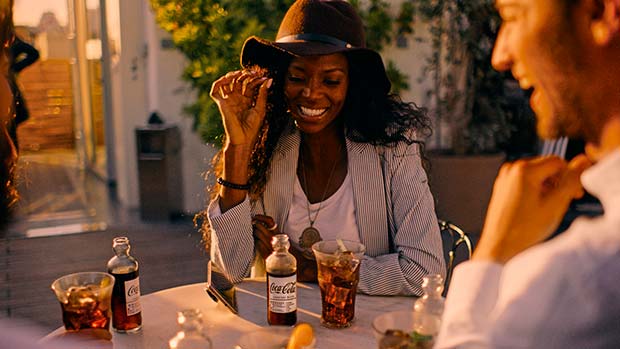It’s been a busy year for Coca-Cola European Partners (CCEP), the sole licensed bottler for The Coca-Cola Company’s products in Western Europe. In the wake of the sugar levy, CCEP’s soft drinks and water brands continue driving the market as consumer demand for low and zero sugar products grows.
 On top of the ongoing stream of NPD, brand extensions and high-profile marketing activity, CCEP’s recent news includes entering the energy drinks sector with the launch of Coca-Cola Energy, the purchase of Costa Coffee and stepping up its investment in sustainability and recycling. Gary Black, Sales Director, Wholesale and Convenience spoke to Wholesale Manager.
On top of the ongoing stream of NPD, brand extensions and high-profile marketing activity, CCEP’s recent news includes entering the energy drinks sector with the launch of Coca-Cola Energy, the purchase of Costa Coffee and stepping up its investment in sustainability and recycling. Gary Black, Sales Director, Wholesale and Convenience spoke to Wholesale Manager.
Following our interview with Gary a year ago, he started our conversation by bringing us up to date:
“Although we sell globally known brands, we’re proud to be a local manufacturer and supplier in Britain, employing some 3,600 people. Over the last year we’ve continued to invest in our operations helping to safeguard our contribution to the British economy. In fact, around 97% of the products we sell here are manufactured at one of our six manufacturing sites.
“Our portfolio has also grown over the last year as we continue our journey to becoming a Total Beverage Company, evolving our portfolio of brands to reach more consumers, on more occasions, every day, which in turn provides more opportunities for wholesalers. We’ve made great progress by expanding our core ranges and entering into new segments to help our customers tap into growing trends and different consumer occasions.
“To ensure we drive the right range and execution in outlets we have re-organised our teams to have a greater focus on specific customer environments. This means we can give enhanced support to wholesalers on how best to tailor their soft drinks offer to meet the diverse needs of their customer base, including convenience, food-to-go and licensed.”
CCEP has increased its field sales team visits to over 850,000 this year alone. Within this, it has a dedicated team calling upon wholesale outlets, providing advice and executional support all year round. Completing the picture CCEP has also stepped up its digital offer:
“Last year, we launched a new ‘Add to Order’ service to make it easier for independent operators to order from their chosen wholesaler. The technology allows retailers to add CCEP products to their next delivery, speeding the process and giving them confidence that any out of stocks or new products are on the way as soon as the order is confirmed. This has been transformational for our customers and we’ve now got hundreds of wholesalers on board and thousands of orders are made weekly.”
A year on from the introduction of the Sugar Tax, Gary Black reviews its effect on soft drink sales and buying behaviour:
“Consumers still want choice. In the lead up to the introduction of the Soft Drinks Tax, we stood firm in our belief that people want choice and love the original taste of favourites like Coca-Cola, so therefore we did not change the recipe. We have also only reformulated when an end product tasted as good as, or even better than, the original. As a result of this strategy, we have seen continued positive performance from our core brands and accelerated growth across our low and zero sugar variants as more consumers opt for lighter variants.
“For example, in impulse our light cola brands – Diet Coke and Coca-Cola zero sugar – are growing by 21%1, our zero sugar variants of Fanta, Sprite and Dr Pepper are up 17%2 and our Monster Ultra range of zero sugar energy drinks are up 36%3. In addition, Coca-Cola original taste remains the biggest soft drink in Britain and is growing by 9% in impulse4, showing consumers still demand choice for different occasions when it comes to soft drinks.”
 Low and no sugar soft drinks will continue to be part of the plan, says Gary: “As part of delivering on our Total Beverage Company strategy we remain focused on introducing low and no sugar soft drinks and helping consumers make more informed choices through clear on pack product messaging and offering a wider range of format sizes so consumers can moderate their consumption. Last year, 67% of our volume in Britain came from low or zero calorie soft drinks5, and this continues to grow.
Low and no sugar soft drinks will continue to be part of the plan, says Gary: “As part of delivering on our Total Beverage Company strategy we remain focused on introducing low and no sugar soft drinks and helping consumers make more informed choices through clear on pack product messaging and offering a wider range of format sizes so consumers can moderate their consumption. Last year, 67% of our volume in Britain came from low or zero calorie soft drinks5, and this continues to grow.
“We’ve made great progress on our journey to becoming a Total Beverage Company by expanding our core ranges and entering into new segments to help our customers across a variety of environments tap into growing trends and different consumer occasions. Our efforts have been focused on the core principle of growing the core whilst adding some more.”
In convenience outlets, says Gary, sparkling soft drinks and energy drinks are key performing segments:
“To help grow our much-loved range of core brands we have put flavour innovation at the heart of our strategy to excite shoppers, specifically across our low and zero sugar variants. This year, we’ve expanded our light Cola flavours with the launch of Diet Coke Twisted Strawberry and Coca-Cola zero sugar Raspberry, now worth £7m6. We also introduced Fanta Zero Grape following huge demand for the flavour on social media. Since the launch in March, the variant is worth £5m7 and delivering the highest rate of sale across all Fanta variants, presenting a huge opportunity for wholesalers and retailers alike to capitalise on sales.”
Flavour innovation is also helping grow the energy segment, says Gary, appealing to existing energy drinkers while recruiting new consumers. This year CCEP bolstered the Monster Ultra zero sugar range with the introduction of Monster Ultra Blue, a citrus berry flavoured variant. After just three years, the Monster Ultra range is now worth almost £60m and still growing 36%8. Next, in May, CCEP launched Coca-Cola Energy, the first energy drink under the Coca-Cola brand, combining the great Coca-Cola taste with caffeine from naturally-derived sources, guarana extracts and B vitamins. The two 250ml variants – with and without sugar – are worth almost £3.5m since launch9.
As well as growing its core ranges, Coca-Cola has added some more innovation taking their brands into new segments, as well as different customer environments such as licensed outlets. Tapping into cocktail culture and premium mixers’ growing popularity in licensed it has launched Coca-Cola Signature Mixers, a range of four specially-crafted drinks that builds on the brand’s longstanding reputation as the original, authentic mixer enjoyed across the world. The range launched in July through licensed wholesalers for pubs, bars and restaurants.
Completing the lineup, says Gary, the Costa Coffee 250ml RTD can range currently rolling out nationwide is particularly relevant for convenience and includes Classic Latte, Caramel Latte and Black Americano. Each variant contains 30% less sugar than most other RTD coffees and is made with the same Mocha Italia coffee beans used in Costa’s high street cafes.
With so much going on in the marketplace, CCEP’s category management advice remains consistent: “We recommend that wholesalers select best-selling brands that are being well supported by manufacturers, those that have been developed in response to consumer trends and from large or growing soft drink segments. To get the best results suppliers, wholesalers and retailers need to collaborate more, sharing data where appropriate to show where future changes can be made to develop the channel.”




Comments are closed.